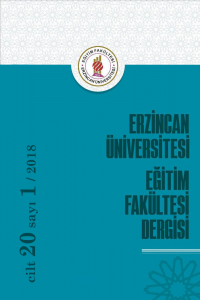Akran Öğretimi Yöntemiyle Öğrencilerin Kavram Öğrenme ve Problem Çözme Başarısının Değerlendirilmesi
Öz
Bu
araştırmada akran öğretimi yöntemi ile öğretmen merkezli geleneksel öğretim
yönteminin öğrencilerin kavram öğrenme ve problem çözme başarısı üzerindeki
etkisi araştırılmıştır. Araştırmanın sonuçlarını karşılaştırabilmek ve
değerlendirebilmek için çalışma iki ayrı gruba uygulanmıştır. Araştırmanın
deney grubuna akran öğretimi yöntemi uygulanırken kontrol grubuna öğretmen
merkezli geleneksel öğretim yöntemi uygulanmıştır. Araştırma temel fizik
dersine kayıtlanan toplam 59 öğrenci üzerinde yürütülmüştür. Araştırmanın
verileri Temel Mekanik Test yardımıyla toplanmıştır. Araştırmanın sonuçlarına
göre akran öğretimi yöntemi ile öğrenim gören öğrencilerin kavram öğrenme,
problem çözme ve grafik yorumlama başarısının öğretmen merkezli geleneksel
öğretim yöntemi ile öğrenim gören öğrencilerin başarısından daha yüksek olduğu
bulunmuştur. Akran öğretimi yöntemiyle öğrenim gören öğrencilerin derse olan
ilgisinin ve katılımının da arttığı
gözlenmiştir. Araştırmanın sonuçlarına dayalı olarak daha sonra yapılacak araştırmalara
ışık tutacak bazı öneriler sunulmuştur.
Anahtar Kelimeler
Kaynakça
- Author (2011).
- Author (2012).
- Author (2013).
- Author (2015).
- Authors. (2016).
- Authors. (2017).
- Ateş, S. (2008). Mekanik konularındaki kavramları anlama düzeyi ve problem çözme becerilerine cinsiyetin etkisi. Eğitim ve Bilim, 33(148), 3-12.
- Brooks, J., & Koretsky, M. D. (2011). The influence of group discussion on students’ responses and confidence during peer instruction. Journal of Chemical Education, 88, 1477–1484.
- Bybee, R. W. (2010). What is STEM education? Science, 329, 996.
- Crouch, C. H., & Mazur, E. (2001). Peer instruction: Ten years of experience and results. American Journal of Physics, 69, 970–977.
- Crouch, C. H., Watkins, J., Fagen, A. P., & Mazur, E. (2007). Peer instruction: Engaging students one-on-one, all at once. In E. F. Redish & P. Cooney (Eds.), Reviews in physics education research (Vol. 1, 11 p.). College Park, MD: American Association of Physics Teachers. Available from http://www.per-central.org/document/ServeFile.cfm?ID=4990
- Eryılmaz, H. (2004). The effect of peer instruction on high school students' achievement and attitudes toward physics. Unpublished doctoral dissertation, The Middle East Technical University, Ankara.
- Fagen, A. P. Crouch, C. H., & Mazur, E. (2002). Peer instruction: Results from a range of classrooms. The Physics Teacher, 40(4), 206-209.
- Fraenkel, J. R., & Wallen, N. E. (2009). How to design and evaluate research in education. 7th edition, New York: McGraw-Hill, Inc.
- Green, P. J. (2003). Peer instruction in astronomy. Addison-Wesley.
- Hake, R. R. (1998). Interactive-engagement versus traditional methods: A six-thousand student survey of mechanics test data for introductory physics courses. American Journal of Physics, 66, 64–74.
- Hestenes, D., & Wells, M. (1992). A mechanics baseline test. The Physics Teacher, 30, 159-166.
- Hutcheson, G. D., & Sofroniou, N. (1999). The multivariate social science scientist: Statistics using generalized linear models. Thousand Oaks, CA: Sage.Kinnear, P. R., & Gray, C. D. (2008). SPSS 16 made simple. Hove: Psychology Press.
- Lasry, N., Mazur, E., & Watkins, J. (2008). Peer instruction: From Harvard to the two-year college. American Journal of Physics, 76(11), 1066–1069.
- Mazlum, E., & Yiğit, N. (2017). Işık konusundaki kavram bilgisi göstergelerinin ve öğretim kanallarının akran öğretimi uygulamalarıyla incelenmesi. Hacettepe Üniversitesi Eğitim Fakültesi Dergisi, 32(2), 295-311.
- Mazur, E. (1997). Peer instruction: A user’s manual. Upper Saddle River, NJ: Prentice Hall.
- McDermott, L. C. (2001). Oersted medal lecture 2001: Physics education research – The key to student learning. American Journal of Physics, 69(11), 1127-1137.
- McDermott, L. C., Heron, P. R. L., & Shaffer, P. S. (2005). Physics by inquiry: A research-based approach to preparing K-12 teachers of physics and physical science. APS Forum on Education Newsletter, 23-26.
- Novak, G. M., & Patterson, E. (2010). An introduction to just-in-time teaching. In Scott, S. & Mark, M. (Eds.), Just in Time Teaching: Across the Disciplines, and Across the Academy. Sterling, VA: Stylus Publishing.
- Pilzer, S. (2001). Peer instruction in physics and mathematics. Primus, XI (2), 185- 192.
- Rao, S. P., & DiCarlo, S. E. (2001). Active learning of respiratory physiology improves performance on respiratory physiology examinations. Advances in Physiology Education, 25(2), 55-61.
- Redish, E. F. (2004). A theoretical framework for physics education research: Modeling student thinking. Proc. of the International School of Physics “Enrico Fermi” Course CLVI, Research on Physics Education, Italy, 156, 1-64.
- Sayer, R., Marshman, E., & Singh, C., (2016). Case study evaluating just-in-time teaching and peer instruction using clickers in a quantum mechanics course. Physical Review Physics Education Research, 12(020133), 1-23.
- Smith, M. K., Wood, W. B., Adams, W. K., Wieman, C., Knight, J. K., Guild, N., & Su, T. T. (2009). Why peer discussion improves student performance on in-class concept questions. Science, 323, 122-124.
- Smith, M. K., Wood, W. B., Krauter, K., & Knight, J. K. (2011). Combining peer discussion with instructor explanation increases leaning from in-class concept questions. CBE-Life Science Education, 10, 55-63.
- Şimşek, Ö., & Yeşiloğlu, Ö. (2014). Akran öğretimi yönteminin elektrik kavramlarının öğrenimi ve bilimsel süreç becerilerinin kazanımı üzerindeki etkisi, Bayburt Üniversitesi Eğitim Fakültesi Dergisi, 9(2), 72-94.
- Watkins, J., & Mazur, E. (2010). Just in time teaching and peer instruction. In Scott, S. & Mark, M. (Eds.), Just in Time Teaching: Across the Disciplines, and Across the Academy. Sterling, VA: Stylus Publishing.
Ayrıntılar
| Birincil Dil | Türkçe |
|---|---|
| Bölüm | Bu Sayıda |
| Yazarlar | |
| Yayımlanma Tarihi | 1 Nisan 2018 |
| Kabul Tarihi | 16 Mart 2018 |
| Yayımlandığı Sayı | Yıl 2018 Cilt: 20 Sayı: 1 |


